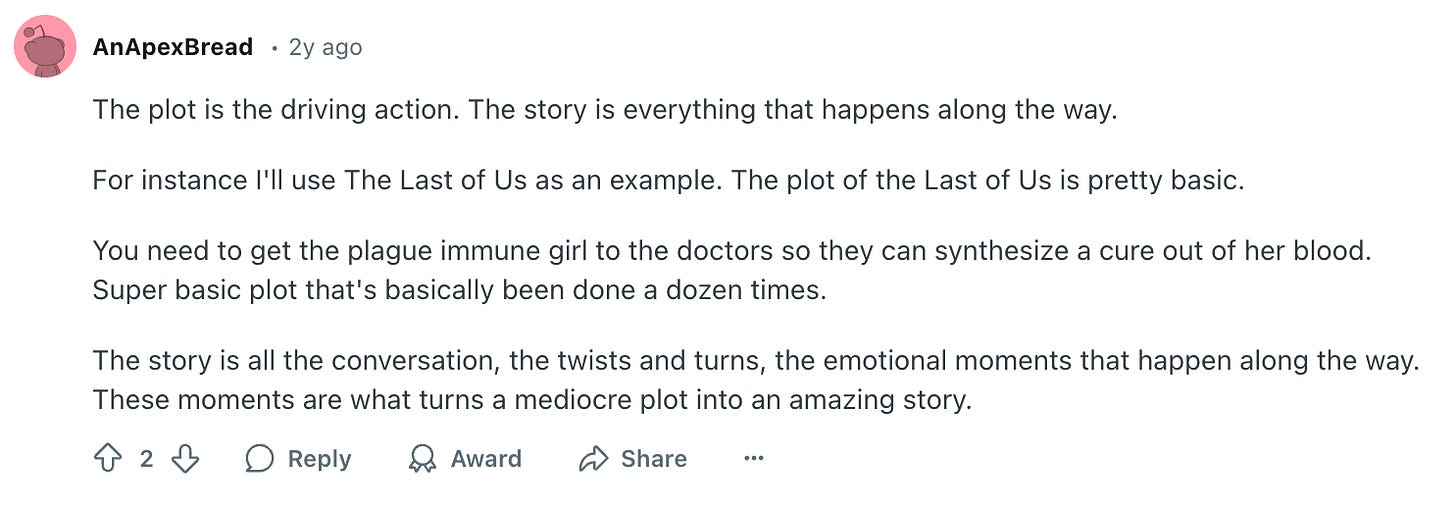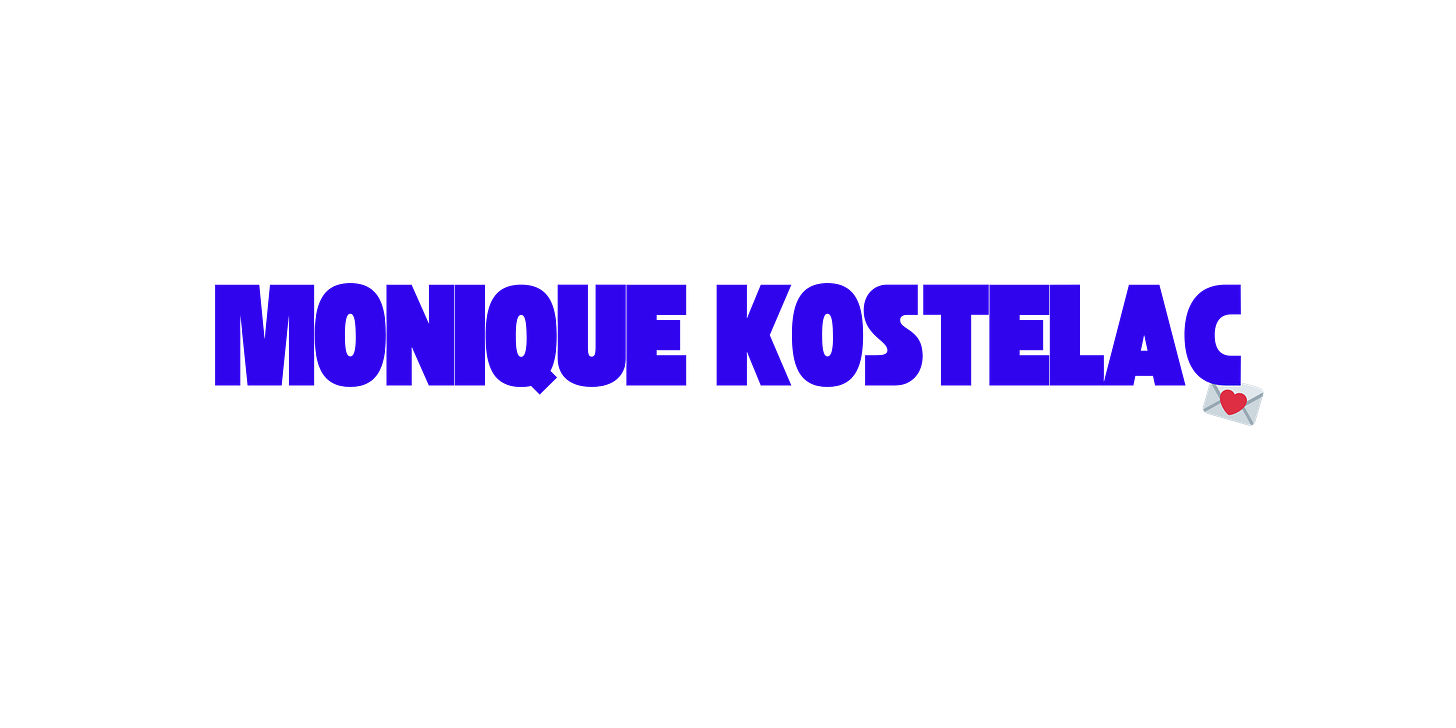How I turn a vague idea into an actual novel
How to go from ✨vibes✨ to an actual novel 📚: sharing my personal process
Have you got all the ✨vibes✨ for an idea but don’t actually have a plot?
Do you have remnants of characters renowned for a particular thing but you don’t actually know what their story is, where they’re going, or where they’ll end up?
Or how about this - maybe you’ve got a concept, an energy, an aesthetic, but you have absolutely no idea how you’re going to turn that into an actual story with words that readers can get invested in.
It’s okay. I got you. (I really need to come up with something more original than an ‘I got you’ because we’re trying to be professional & fancy here).
Some people have holidays that never leave the group chat.
Writers? They have novels.
But we’re going to change that.
We’re going to take your vibey aesthetic of a mood and turn it into a fully-fledged, 85k word novel.
Here’s how:
1/ Write down EVERYTHING you know about your story right now
Brainstorm every detail you’ve already come up with. From descriptions of the vibes (what’s the colour scheme? what’s the energy? when you’re thinking ahead to marketing on social media, what kind of aesthetic would be associated with it?), to the characters, to the random scenes and moments you’ve already figured out. Write it all down so it’s not just in your head (and not just in a bunch of scattered messages spanning the last 6 months).
This will help you get a big picture of what you’re working with and guide your brain to connect the dots.
2 / Give yourself time & space
Seldom do I actually come up with an idea and develop it into a fully-fledged novel concept straight away. Sometimes it takes hours - I could come up with a vibe at 9am and then figure it out by 8pm. Sometimes it takes days. Others weeks. Some even months or years (I know this isn’t what you want to hear, but trust the process of the story). Or more classically, I’ll come up with a vibe, send it to a friend, joke that I don’t know if it’s something legit, have a shower, and then rush out of the shower to reply, “WAIT, I’VE FIGURED IT OUT.”
When I don’t give myself at least a little bit of time and force a concept, it feels wrong. It’s heaviness within my body, especially in my solar plexus. It’s an annoying headache. It’s frustration and anxiety because I’m trying to build something with materials I don’t yet have. It’s like trying to build a house with planks of wood but without the nails and hinges.
Give yourself the time and space to let the story details come to you. When ideas come to you, see if it works. If it does, brilliant. If it doesn’t, let it be a stepping stone to what does. Writing involves a lot of unplanned meetings with yourself in often not so convenient locations. Oh, and before I forget: make sure you get up from your writing space. I find that when I’m stuck, moving about helps the ideas flow to me better.
3/ Ask ‘what if…?’ questions
Let your ‘but what if…’ curiosity shine. Let that annoying 3-year-old voice ask ‘but why?’, ‘but what if?’, ‘but…[insert another question here]?’
Establishing a novel concept from a vague idea isn’t a solid task. It’s not literal. It’s rarely done straight off the bat. You might - once in a blue moon - know what you want to do right away, but oftentimes it takes a second to get there.
How do you get there?
By asking the what if? questions.
Let these questions - and their answers - lead you to what your book is going to be about.
4/ What do you actually want to write? What do you want to say with the story?
Speaking of which, ask yourself what you actually want to be writing. What do you want this story to say? What kind of storylines do you want to include? What kind of storylines do you think could work? What kind of storylines do you want to explore? What do you think would be really fun to write?
And then see what comes up for you.
Remember how I was saying to let your questions (and their answers) lead you to what your book is going to be about? This is one of those moments.
5/ If you’re stuck, look for inspiration.
Or seek the inspiration you might not realise is inspiration. If you’re a writer, chances are that you know your stuff. You probably have extensive knowledge on a variety of different things - things that people always teased you about because ‘who’s going to need to know that?’. It’s those things where when you tell someone about it, they reply: “I have better things to do than watch/learn about/read about that.” Ya know what I’m talking about? I know you do because you read that in someone you know’s voice and a you just rolled your shoulders to relieve yourself of the uncomfortable shudder that came with it.
A couple of months ago, I came up with a screenplay/novel idea. I had the vibes - the restaurant scene in New York City in the 1960s- and I had two or three characters. At first, I had absolutely no idea what the plot was going to be. Then my brain starting piecing random details together thanks to the combination of asking the ‘what if’ questions, and letting those answers lean towards random sources of inspiration. Before I knew it, I had a plot, more characters and an actual story to work with…not that I’ve started on it yet because I’m already working on other stories, but you get my point.
6/ Start writing everything down
With the more information you get, make sure you’re writing it all down. Whether it be in a Google Doc or a notebook, create a sort of bible for everything you need.
7/ The Who, The What, The When, The Where
Okay, maybe I should have had this point a little further up. Don’t forget to ask the super basic questions of who, what, when and where.
Who is it happening to?
What is happening? (To them and overall?)
When is it happening? (Which era? What point in their life?)
Where is it happening? (Where’s the story set? Which country? City? What locations are you setting your scenes in?)
Then build from there.
In the process of giving yourself space & time to figure out the story, make sure you let your world build accordingly. For example, in another screenplay idea I had, the number of characters are slowly building. When I first came up with the idea, I didn’t know I wanted the characters I have now let alone think of them to begin with. How did I come up with? I asked the question of “who else would make sense in this?”. I thought about the type of scenes and the already existing characters, then figured out the type of characters that could enhance the story. Like in this screenplay (a crime/family drama), the main character is a police officer. With the direction the story was going in, I knew I wanted 6 key uniform characters (including the main). I had already established who her partner was as well as another character, so needed 3 more. I didn’t come up with who right away, but with the right combination of inspiration at the perfect moment, I came up with the additional 3. I thought about what the story needed, especially within character dynamics.
Do you know what happened when I decided on the 3? One of the characters went from just a uniform to add to the dynamic, to one of the most important characters in the script. One second they were just another uniform to add to the dynamic, and the next the character essentially forced me to change a major moment in the script which actually turned out for the better and cleared up the final portion of the story that I had been stuck on.
You never actually know where your solution is going to come from. I also think it’s going to be so much fun explaining all that in the interviews once the script is made.
8 / Plot vs Story
So I saw a post on reddit that pretty much sums up this point perfectly.
Your plot is “X happens to Y, but ________, which leads them to Z and they must figure out a solution.” That’s a very basic example of how to write your plot.
The story is what covers everything in between.
Now here’s the controversial part: I don’t pay much attention to plot until I get to the querying stages. Why? Because I want to allow room for the story to develop accordingly. I generally figure out some super basic plot and then let the story do its thing before I come back to said plot and refine it.
9/ Start writing
Once you have your basic information down, you have a rough idea on what you want to happen in your story and you’ve got some form of an outline (even if it’s just knowing the key scenes you want to take place and filling in the blanks), it’s time to start writing. Everyone thinks that in order to start writing your story, you need to know everything about it. But you don’t. You primarily learn about it when you actually start writing. Your planning is just the foundation setting - the writing is when you build your knowledge. It’s like with anything - your university degree gives you the foundations, but the experience is where you learn the most about what you do and also about yourself.
Now before I leave you with this post, I wanted to remind you that everyone’s process is different. You might resonate with this post, or you might think you’ve wasted the last however long a read Substack said this would be on a bunch of irrelevant gibberish.
If there is one thing to take away, it’s this: developing your story from a vague idea into a novel concept is primarily reliant on asking yourself the right questions.








